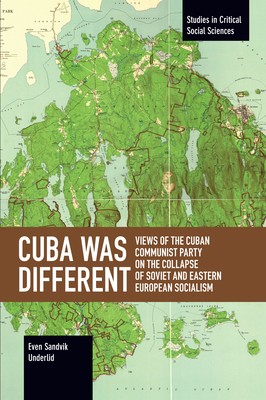
- We will send in 10–14 business days.
- Author: Even Sandvik Underlid
- Publisher: Haymarket Books
- ISBN-10: 1642596191
- ISBN-13: 9781642596199
- Format: 15.5 x 22.9 x 2.5 cm, minkšti viršeliai
- Language: English
- SAVE -10% with code: EXTRA
Reviews
Description
In Cuba Was Different, Even Sandvik Underlid explores the views of Cuban authorities, official press, and Party members as they reflect back on the collapse of Soviet and Eastern European socialism. In so doing, he contributes to a better understanding as to why the Cuban system--often associated with Fidel Castro leadership--did not itself collapse. Despite the loss of its most important allies, key ideological referents, and even most of its foreign trade, Cuba did not embrace capitalism.
The author critically examines and analyzes the collapse of the USSR and Eastern Europe as reported in the Cuban Communist Party newspaper Granma, both as they unfolded and subsequently through the lens of additional interviews with individual Party members. This focus on Cuba's Communist Party provides new perspectives on how these events were seen from Cuba and on the notable resilience of many party members.
EXTRA 10 % discount with code: EXTRA
The promotion ends in 21d.14:22:19
The discount code is valid when purchasing from 10 €. Discounts do not stack.
- Author: Even Sandvik Underlid
- Publisher: Haymarket Books
- ISBN-10: 1642596191
- ISBN-13: 9781642596199
- Format: 15.5 x 22.9 x 2.5 cm, minkšti viršeliai
- Language: English English
In Cuba Was Different, Even Sandvik Underlid explores the views of Cuban authorities, official press, and Party members as they reflect back on the collapse of Soviet and Eastern European socialism. In so doing, he contributes to a better understanding as to why the Cuban system--often associated with Fidel Castro leadership--did not itself collapse. Despite the loss of its most important allies, key ideological referents, and even most of its foreign trade, Cuba did not embrace capitalism.
The author critically examines and analyzes the collapse of the USSR and Eastern Europe as reported in the Cuban Communist Party newspaper Granma, both as they unfolded and subsequently through the lens of additional interviews with individual Party members. This focus on Cuba's Communist Party provides new perspectives on how these events were seen from Cuba and on the notable resilience of many party members.


Reviews